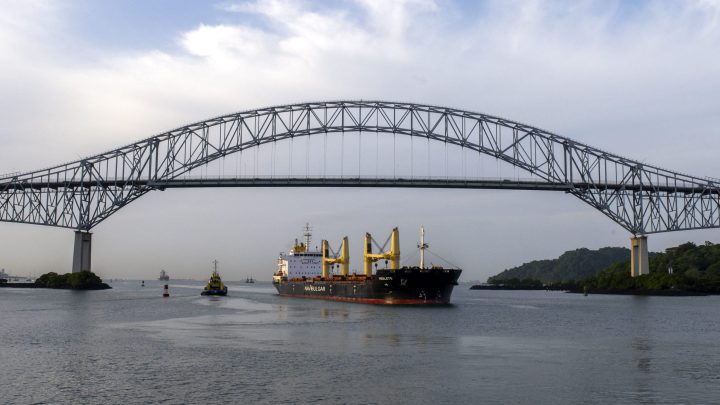
Panama Canal faces uncertain future because of climate change, drought
Panama Canal faces uncertain future because of climate change, drought

The Panama Canal is a small but mighty link in the global shipping industry. But it’s facing an uncertain future because of climate change and severe drought. This year’s El Niño may make matters even worse.
Six percent of all global trade passes through the canal’s 50-mile stretch of water. New passage restrictions could particularly harm the U.S. economy — since we’re the nation that uses the trade route the most.
The Panama Canal has functioned with the same technology for more than a hundred years, a system of locks.
“They are elevators that lift giant ships by filling them with freshwater,” said Benjamin Gedan, who directs the Latin America program at the Wilson Center. “And when a ship leaves the canal, that water leaves this chamber and goes into the ocean to bring a ship back to sea level.”
But here’s the thing: The system needs freshwater from Panama’s lakes — about 50 million gallons of it for each ship.
“Historically, that wasn’t a problem, right. Panama is a tropical country,” Gedan said. “But given climate change impacts, it is a problem now.”
Gedan met with senior leaders of the Panama Canal Authority just a few months ago. “And water was what everybody was talking about.”
The lack of it, that is. Meteorologist Jon Davis studies supply chain disruptions caused by environment and weather for Everstream Analytics. He points out that around 14,000 vessels travel through the Panama Canal every year.
“So when you think about the amount of freshwater that is really required to make the Panama Canal work,” Davis said. “There’s nothing more important than the freshwater.”
And also important? The goods that come through the canal to the U.S.
“It’s pretty much everything. A lot of food product from coffee to bananas, you know, coming across to mining materials, copper,” Davis said.
Droughts in Panama aren’t new, Davis said — but they are getting worse. And El Niño this year isn’t helping. When there’s not enough water, the canal authority puts restrictions on shipping companies.
“Which essentially require boats to carry a lighter load,” said Todd Martinez with Fitch Ratings, the credit rating agency. “And they also apply surcharges on the cargo.”
He added that some shipping companies may start trying to avoid those restrictions by diverting to other sea routes, like the Suez Canal — or even shipping overland by rail or truck.
“So that could add to wait times to get merchandise to the U.S.,” Martinez said.
In other words, yet another supply chain slowdown — exactly what the U.S. economy doesn’t need to keep inflation at bay.
There’s a lot happening in the world. Through it all, Marketplace is here for you.
You rely on Marketplace to break down the world’s events and tell you how it affects you in a fact-based, approachable way. We rely on your financial support to keep making that possible.
Your donation today powers the independent journalism that you rely on. For just $5/month, you can help sustain Marketplace so we can keep reporting on the things that matter to you.












